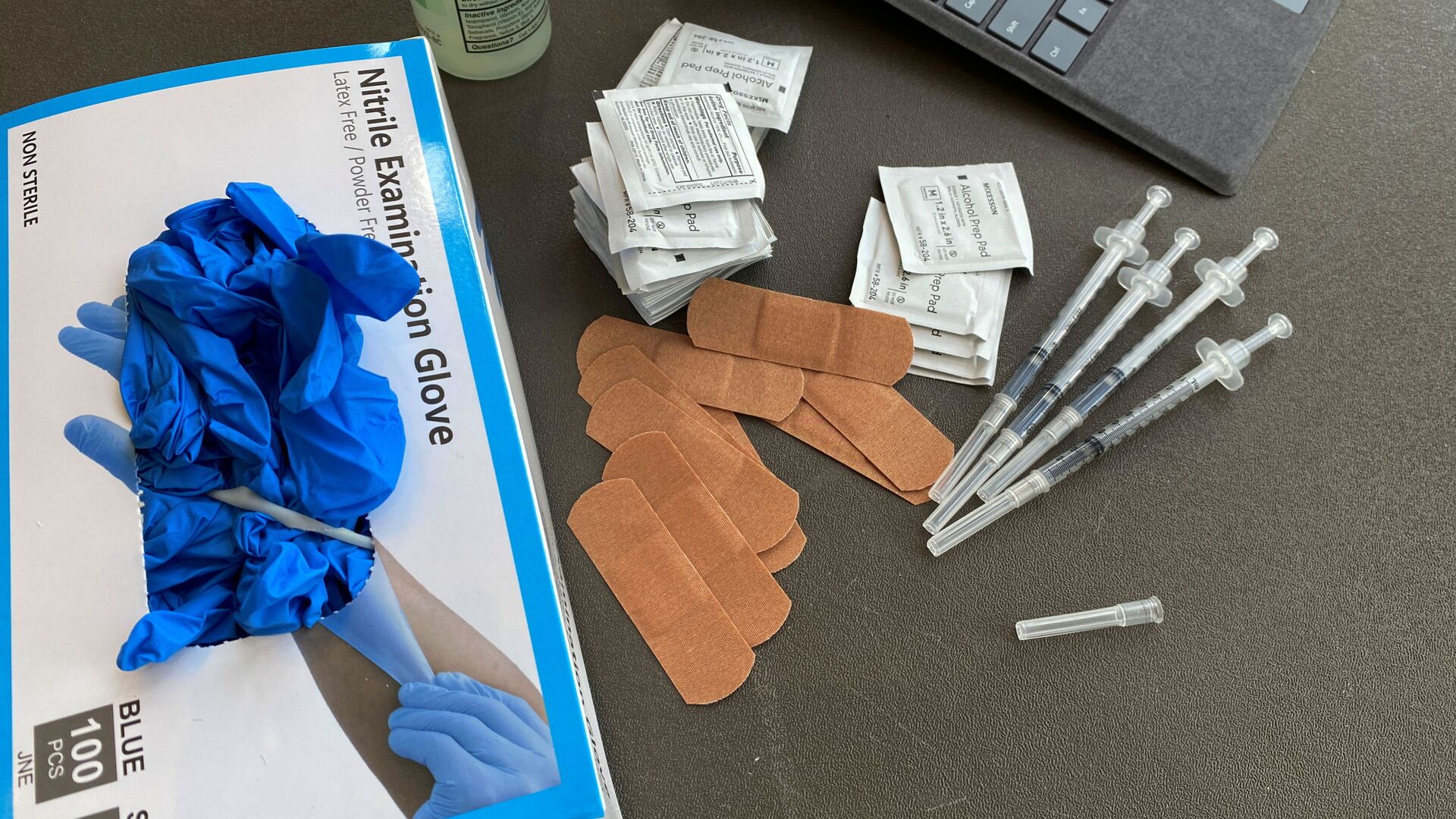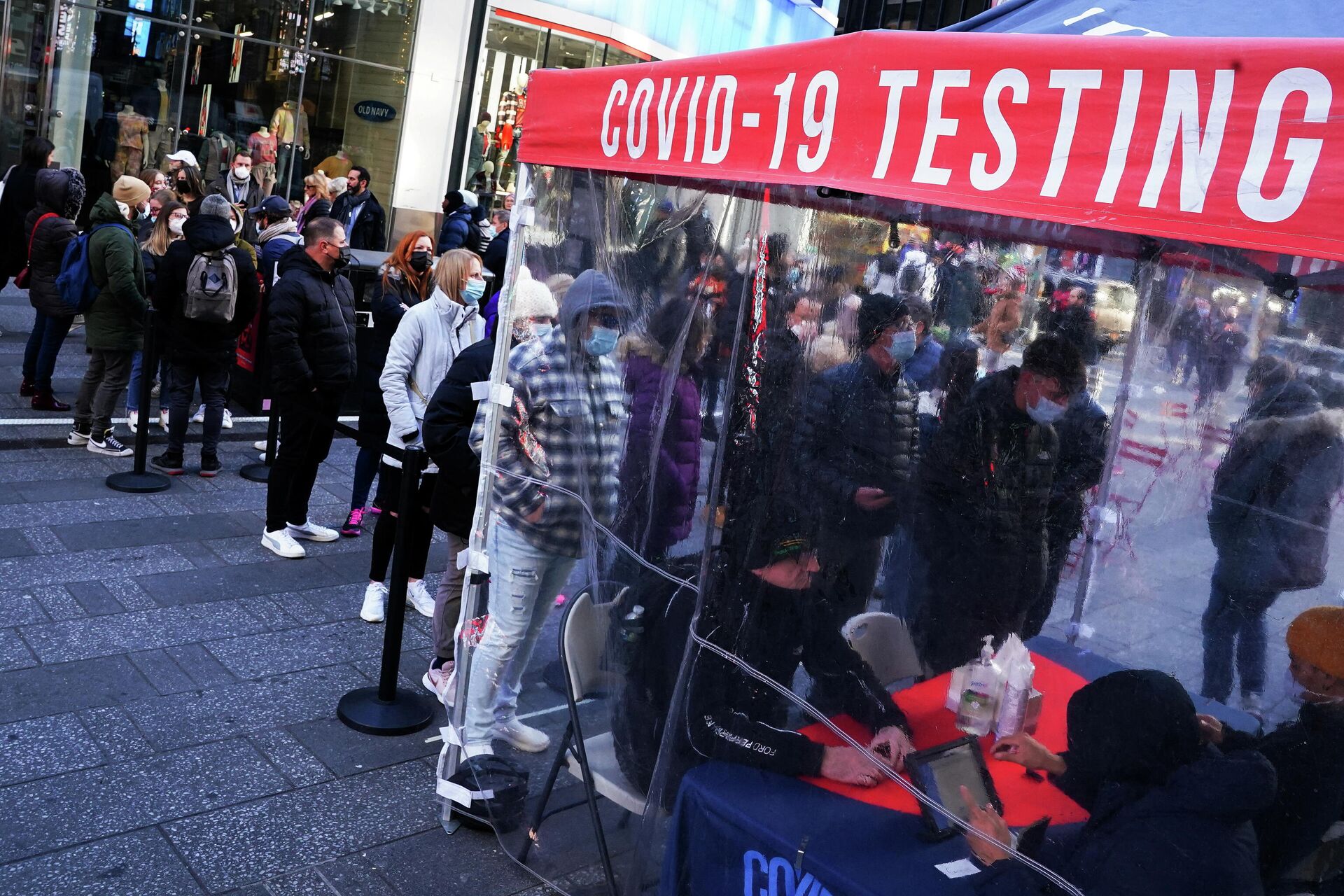https://sputnikglobe.com/20211220/us-hospitals-overwhelmed-and-not-ready-for-influx-of-omicron-patients-reports-say-1091662709.html
US Hospitals Overwhelmed and Not Ready for Influx of Omicron Patients, Reports Say
US Hospitals Overwhelmed and Not Ready for Influx of Omicron Patients, Reports Say
Sputnik International
Intensive care units in US hospitals are overwhelmed ahead of the expected surge in cases of the Omicron variant of COVID-19, with non-COVID patients suffering from severe health issues and surging Delta strain cases already stretching many hospitals thin, The Wall Street Journal has reported.
2021-12-20T09:03+0000
2021-12-20T09:03+0000
2021-12-20T09:13+0000
omicron covid strain
us
coronavirus
covid-19
https://cdn1.img.sputnikglobe.com/img/07e5/08/19/1083712159_0:257:2731:1793_1920x0_80_0_0_892e5558a79da005cb3d150782a47e20.jpg
In many cities hospitals' intensive care units are overloaded with patients who need emergency care, including those with the Delta strain and non-COVID-19-related diseases like cancer or heart disease. In many hospitals few beds are available in anticipation of the influx of patients with the more contagious Omicron variant, the news outlet said on Sunday.Across the country hospitals in 92 cities have reached average intensive-care occupancy of 100% or more, the newspaper said citing data from the University of Minnesota's COVID-19 Hospitalisation Tracking Project. Meanwhile, last week, nearly 310 cities had intensive care units moving toward full loads with average occupancy varying from 90% to 99%.Hospital executives claim that the situation is compounded by "widespread staffing shortages" in the health sector. While the current influx of patients largely stems from many people having delayed their treatment, fearful of acquiring COVID-19 at a hospital.According to The Wall Street Journal, doctors at a Minneapolis hospital were compelled to send home patients in less critical condition, though ordinarily they would have been hospitalised. As specialists argue, delaying treatment may cause severe complications, noting that during previous pandemic upsurges, patients who needed intensive care "died before they could get it".On Sunday, White House medical adviser Anthony Fauci forecast an increased burden on US hospitals due to the spread of the Omicron strain.The United States is currently going through another COVID-19 upswing with about 130,000 cases registered daily, which is the highest rate worldwide. Around 60% of the population is fully vaccinated, while 50 million eligible Americans remain unvaccinated, significantly undermining efforts to contain the Omicron surge.
Sputnik International
feedback@sputniknews.com
+74956456601
MIA „Rosiya Segodnya“
2021
Sputnik International
feedback@sputniknews.com
+74956456601
MIA „Rosiya Segodnya“
News
en_EN
Sputnik International
feedback@sputniknews.com
+74956456601
MIA „Rosiya Segodnya“
Sputnik International
feedback@sputniknews.com
+74956456601
MIA „Rosiya Segodnya“
omicron, us, covid, hospitals overwhelmed
omicron, us, covid, hospitals overwhelmed
US Hospitals Overwhelmed and Not Ready for Influx of Omicron Patients, Reports Say
09:03 GMT 20.12.2021 (Updated: 09:13 GMT 20.12.2021) MOSCOW (Sputnik) - Intensive care units in US hospitals are overwhelmed ahead of the expected surge in cases of the Omicron variant of COVID-19, with non-COVID patients suffering from severe health issues and surging Delta strain cases already stretching many hospitals thin, The Wall Street Journal has reported.
In many cities hospitals' intensive care units are overloaded with patients who need emergency care, including those with the Delta strain and non-COVID-19-related diseases like cancer or heart disease. In many hospitals few beds are available in anticipation of the influx of patients with the more contagious Omicron variant, the news outlet said on Sunday.
Across the country hospitals in 92 cities have reached average intensive-care occupancy of 100% or more, the newspaper said citing data from the University of Minnesota's COVID-19 Hospitalisation Tracking Project. Meanwhile, last week, nearly 310 cities had intensive care units moving toward full loads with
average occupancy varying from 90% to 99%.Hospital executives claim that the situation is compounded by "widespread staffing shortages" in the health sector. While the current influx of patients largely stems from many people having delayed their treatment, fearful of acquiring COVID-19 at a hospital.
According to The Wall Street Journal, doctors at a Minneapolis hospital were compelled to send home patients in less critical condition, though ordinarily they would have been hospitalised. As specialists argue, delaying treatment may cause severe complications, noting that during previous pandemic upsurges, patients who needed intensive care "died before they could get it".
On Sunday, White House medical adviser Anthony Fauci forecast an increased burden on US hospitals due to the
spread of the Omicron strain.The United States is currently going through another COVID-19 upswing with about 130,000 cases registered daily, which is the highest rate worldwide. Around 60% of the population is fully vaccinated, while 50 million eligible Americans remain unvaccinated, significantly undermining efforts to contain the Omicron surge.





